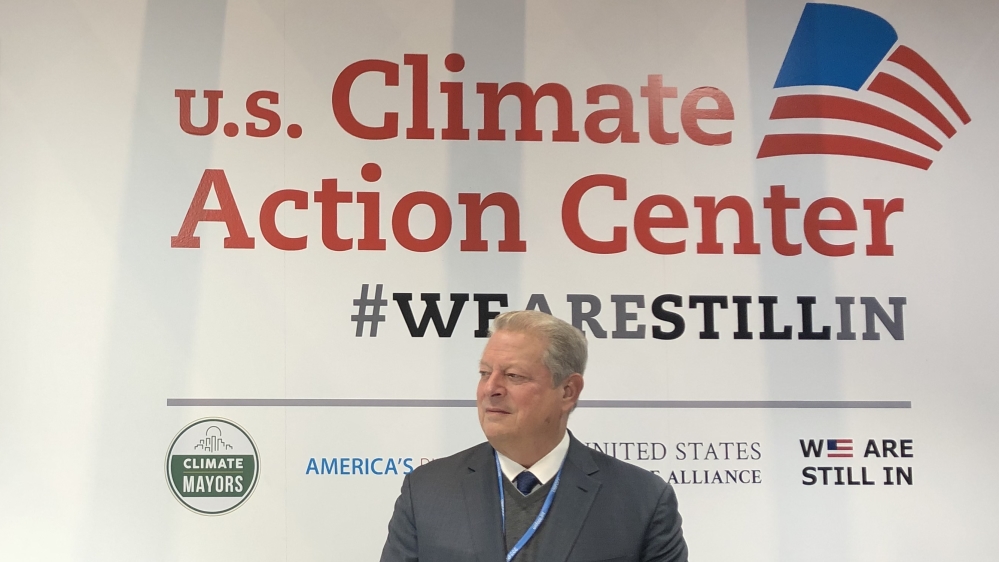Will youth climate activists see their pleas answered in 2020?
Though national leaders are gripped by inertia, powerful actors are nudging the needle forward on climate action.

Young climate activists commanded the world’s attention in 2019, but as the sun rises on a new decade, the jury is out on whether their pleas to global policymakers will translate into concrete action in 2020.
Time magazine’s Person of the Year, Swedish teen climate and environmental activist Greta Thunberg, set the tone for the challenge ahead, tweeting on New Year’s Eve, “This coming decade humanity will decide its future. Let’s make it the best one we can. We have to do the impossible.”
Keep reading
list of 4 itemsPhotos: Flash floods in Afghanistan devastate lives and livelihoods
Brazil flooding death toll hits 100 as government pledges aid
‘Desperate’ rescues under way as Brazil floods kill 90, displace thousands
With her Fridays for Future climate marches, the focused Scandinavian teenager zeroed in on an idea taking root across the planet: youth cannot trust adults to embrace the facts about greenhouse gas emissions and take meaningful action to combat global warming.
Report after report from the United Nations Intergovernmental Panel on Climate Change (IPCC) shows that without significant reductions in the amount of fossil fuels burned by countries around the globe, average temperatures will continue to rise faster and faster. But many national policymakers continue to be gripped by inertia as they weigh the cost of emissions mitigation against the potential near-term hit to their countries’ economic growth.
But not everyone is turning a deaf ear to climate warnings. Powerful actors – from subnational politicians and lawmakers, to sovereign wealth fund managers, to investors and the private sector – are nudging the needle forward on combatting global heating. And 2020 may yet produce an event that prompts national leaders to take stronger action.

Bright spots in dark days
Activists are calling for a host of measures to pull the planet back from the brink of climate destruction, from cutting back the coal, oil and gas consumed for energy, industry, transportation and buildings, to coastal adaptation, natural resilience and carbon removal.
Yet, from New York City’s UN Climate Action Summit in September to Madrid’s COP25 gathering in December, delegates of national governments did not commit to an enhanced system for drawing down emissions.
An accord on carbon markets is still a sticking point, as big emitters want to trade credits from the past to get off the hook later. And vulnerable societies are furious that developed nations refuse to enact a loss-and-damage approach so that poor countries need not cover costs for catastrophic consequences of extreme weather.
Carlos Fuller, the lead negotiator for the Alliance of Small Island States, said that the UN climate conference was “a defining moment for us. It must trigger a decade of ambition”.
“At this stage, we are being cornered,” Fuller added. “We fear having to concede on too many issues.”
But there are causes for hope as political parties, corporate executives and ordinary investors tune into dire predictions flagged by scientists.
In the United States, the Green New Deal highlighted inaction by the federal government under Republican President Donald Trump. Though that combination of renewable energy incentives and new jobs has not materialised, subnational actors in the US are ensuring that states and cities uphold the goals of the 2015 Paris climate pact as the White House pulls out.

Calls for World War II-scale mobilisation have echoed beyond the US, but who will pay for the transition is unclear. And despite objections by climate watchdogs, natural gas continues to be developed as a bridge fuel before enough solar and wind power is generated.
The ambitious European Green Deal in Brussels staked out a new goal for the 28-member European Union bloc to become climate-neutral by 2050. And after victories this year at the ballot box, greener authorities from sunny Spain to thousands of city halls across the planet are implementing better policies.
The language for describing the climate emergency in the media has also evolved, responding to the gravity of the situation and the unsustainable rate of human consumption.
Pushing the needle
Amazon and other large companies continue to receive criticism from investors about their carbon footprints. Asset managers such as BlackRock have been targeted by the socially responsible investment community for failure to divest from fossil fuels.
Nevertheless, impact investment is exploding, with a strong emphasis on solving climate problems. And Norway’s enormous sovereign wealth fund, among others, has taken bold stances against oil project financing and deforestation in Brazil.
In the private sector, hundreds of firms are pledging to meet science-based targets, while big purchasers demand that their suppliers use electricity from cleaner sources.
Paul Simpson, CEO of CDP, said that “630 institutional investors managing $37 trillion in assets called on governments to upgrade their national plans.”
“Political leaders can and should take confidence from the groundswell of business action,” he added. “But so far, their response has not been commensurate with what is needed.”
Even so, many analysts say money is the bottom line as bulging populations take advantage of cheap and plentiful energy, while carbon pricing schemes have yet to win over hearts and minds.

Three possibilities could force the hands of global decision-makers, however.
If a climate-driven “act of God” sets off a true financial crisis – with insurance firms unable to stay afloat after unprecedented wildfires and cyclones – political leaders could respond in kind.
A major technological breakthrough in renewable energy storage or geoengineering may bring down the cost of switching from fossil fuels to sustainable energy.
And strategic rivalries, such as competition between China and the US, could catalyse domestic moonshot projects.
In the run-up to COP26 in Glasgow this year, climate activists hope that world leaders will seek – and take – advice from their young guiding stars on how best to move forward.